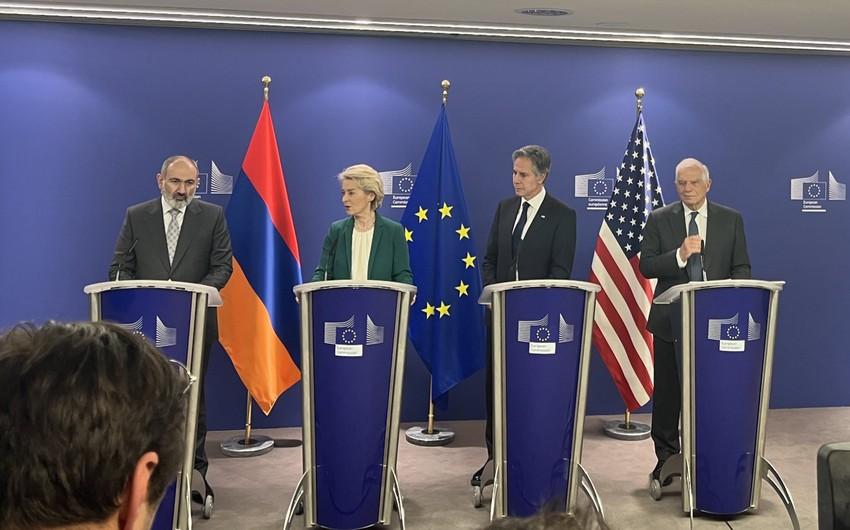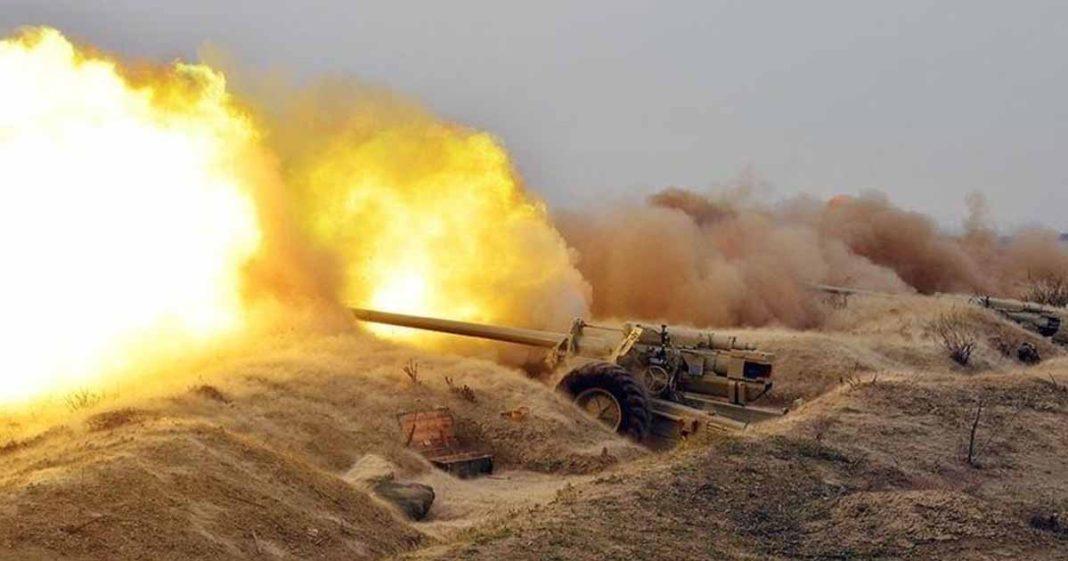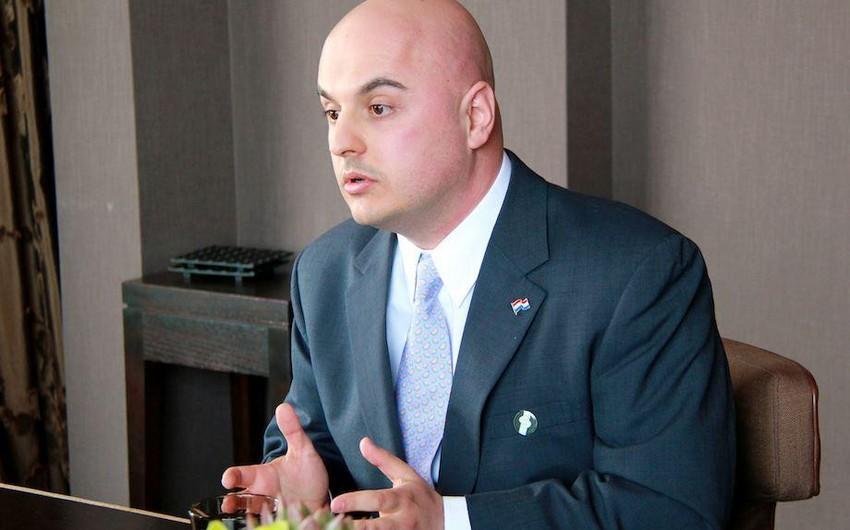Brussels summit exacerbates tensions along Azerbaijani-Armenian border
Tensions run high
ANALYTICS 08 April 2024 - 17:35
| Fuad Muxtar-Agbabali |
The recent developments stemming from the April 5 Brussels summit, where Armenia engaged in discussions with the USA and the EU, have significantly heightened tensions along the Azerbaijani-Armenian conditional border. The aftermath of the summit has not only seen a military build-up along the border but also witnessed a flurry of official statements trading accusations, further exacerbating an already delicate situation in the region.
Armenia's engagement with key Western partners has raised concerns in Azerbaijan, which perceives it as a potential signal for heightened interference in the ongoing tensions in the absence of a peace treaty between Yerevan and Baku. The mere involvement of major Western powers in discussions on the South Caucasus has stirred apprehensions, with Azerbaijan interpreting it as a move to embolden Armenia to maintain its aggressive stance along the border.
In response, Azerbaijan has also ramped up Yerevan’s military preparedness, viewing the Brussels summit as a precursor to potential provocations by Armenia. Official statements from Baku have underscored Azerbaijan's commitment to safeguarding its territorial integrity and sovereignty, while simultaneously accusing Armenia of provocations and escalating tensions along the border.
The trading of accusations in official statements reflects the deep-seated mistrust and unresolved grievances between Azerbaijan and Armenia. Both sides have historically utilized such rhetoric to assert their respective narratives and garner international support for their positions. However, in the current context, these statements risk further escalating tensions and undermining efforts towards peaceful resolution.
The Brussels summit has thus become a focal point for heightened tensions, with both Azerbaijan and Armenia closely monitoring the implications of discussions held with the USA and the EU. As the repercussions of the Brussels summit continue to unfold, the fear of external interference exacerbating an already volatile situation looms large.

Behind closed doors at the EU headquarters in Brussels, discussions regarding Armenia's potential rapprochement with NATO and the EU were held, some experts believe, sparking Azerbaijan’s apprehension. The intensity of phone calls received by President Ilham Aliyev from high-ranking Euro-Atlantic leaders underscores the gravity of the situation and Azerbaijan's perceived vulnerability amidst shifting geopolitical dynamics.
While the direct accession of Armenia into NATO and the latter’s military aid are not openly discussed, the prospect of enhanced cooperation between Armenia and the Western alliance poses significant security implications for Azerbaijan. The evolving dynamics in the South Caucasus underscore the complex interplay between regional actors and external powers.
Armenia's quest for a new "security sponsor" has shifted the balance of power, with France emerging as a significant player in the region. On the other hand, France is openly providing Armenia with weapons and military hardware, adding to Baku’s anxiety that a similar process is also underway through different clandestine channels. This realignment has created opposing coalitions, with Turkey, Azerbaijan, and Russia on one side, and France and the EU on the other. The strategic calculus for Moscow necessitates pragmatic engagement with Turkey to counterbalance Western influence in Armenia, highlighting the intricate geopolitical maneuvering at play.

Western support, including economic aid and military assistance, could potentially embolden Armenia and escalate tensions in the region. Reports suggesting plans for joint military exercises, the provision of advanced weaponry, and specialized training for Armenian forces indicate a strategic reorientation that threatens Azerbaijan's security interests.
President Aliyev's assertion that the summit's agenda is aimed against Azerbaijan highlights the perceived existential threat posed by Armenia's alignment with Western powers. The strengthening of Armenia under Western patronage raises concerns of renewed territorial claims and military aggression, especially in the aftermath of the Second Karabakh War. Azerbaijan's vulnerability to potential hostilities is exacerbated by its ongoing efforts to bolster its military capabilities, including collaborations with Turkey to enhance domestic production.
The geopolitical ramifications extend beyond the South Caucasus, with implications for regional stability and great power dynamics. A potential armed conflict in the South Caucasus, outside NATO's security zone, could serve Western interests by exerting pressure on Russia and indirectly influencing developments in Ukraine. Additionally, NATO's proximity to Iran's border could enhance intelligence-gathering capabilities, furthering Western strategic objectives in the broader Middle East region.
Armenia's military buildup heightens tensions along border with Azerbaijan
Following a recent meeting in Brussels, reports are emerging indicating Armenia's intensified efforts to amass troops and military equipment along the conventional border with Azerbaijan. This escalation has led to provocations and heightened tensions in the already volatile region. Observers suggest that Armenia's deliberate maintenance of tension along the border serves to deter the gradually continuing return of native inhabitants who have been displaced for almost three decades.
“In looking back in history, Armenia government has always acted in bad faith in regards to its international commitments, it has violated the main tenets of regional security in South Caucasus and Europe,” Peter Tase, US expert, researcher of international relations and geopolitics of Eurasia, told Caliber.Az in exclusive remarks.

“The April 6 armed provocations of Armenia against Azerbaijani positions, which lasted almost six hours, are a clear testimony of Armenian belligerent posture to hold the region hostage, by creating a high level of turmoil and insecurity. The recent attacks once again show Armenia scoffing at Western powers and certifying what Caliber.Az has articulated for some time, a fact that is impossible to ignore!” Peter Tase further added.
In a similar development, some experts also advocate for the establishment of a buffer zone to ensure the safety of civilians as they are being relocated back to their homes as Azerbaijan has been rebuilding villages and towns razed to the ground by Armenia's 30-year-long aggression.
Following the September 2022 border clash prompted by the Armenian army, Azerbaijan created buffer zones in certain segments of the border to prevent further escalation. The recent spike in tension, coinciding with Armenia's meeting with the EU and the USA in Brussels, has raised concerns among military experts, with some viewing the recent unfolding developments and construction of military facilities along the border as encouraging signals from the West and Yerevan’s reliance on their backing in case of border hostilities.
Despite the present lack of conducive conditions for peaceful negotiations, escalating processes could pave the way for larger operations. The involvement of major powers such as the West and Russia in the conflict adds a layer of complexity, making it challenging for Azerbaijan and Armenia to steer clear of a full-blown war.
Conclusion
The recent military buildup by Armenia along the Azerbaijan border has exacerbated tensions along the conditional border. With unresolved disputes over territories and the return of displaced people, the situation remains precarious. As major powers monitor the situation, the risk of escalation underscores the urgent need for diplomatic solutions to prevent further destabilization in the South Caucasus.
The Brussels summit and its implications underscore the geopolitical complexities and struggles for influence in the South Caucasus. The convergence of regional rivalries, great power competition, and economic interests amplifies the risks of escalation and instability.
Caliber.Az
|
1
|
700 tunnel shafts found in Rafah, 50 cross into Egypt Israel informs South Africa at UN top court
17 May 2024 - 15:56
|
|
2
|
Uncertainty over Russian border guard withdrawal from Armenia Amid conflicting statements
18 May 2024 - 14:47
|
|
3
|
New Caledonia crisis mirrors Macron's hypocrisy on Azerbaijan France faces its own crisis
17 May 2024 - 17:20
|
|
4
|
Giant meteor seen lighting up skies of Portugal
19 May 2024 - 13:11
|
|
5
|
Azerbaijan sets priorities ahead of COP29 "Green" financing, ESG implementation
18 May 2024 - 12:13
|
How are museums still justifying keeping stolen artifacts?
Bloomberg reveals20 May 2024 - 00:03
Techcraft on display in Ukraine
Analysis by War on the Rocks19 May 2024 - 22:00
Chinese state-backed company to launch space tourism flights by 2028
19 May 2024 - 20:01
Ukraine destroys another Russian ship
19 May 2024 - 18:01
Slovak PM Fico no longer in immediate danger but condition serious, deputy says
19 May 2024 - 17:40
Iranian president's helicopter makes hard landing on border with Azerbaijan
19 May 2024 - 17:25
Russia's forces shot down 9 ATACMS missiles, 61 drones overnight
19 May 2024 - 17:17
France mobilises police to regain control of New Caledonia airport road
19 May 2024 - 16:49
India doubles purchase of Russian diamonds
19 May 2024 - 16:26
Venezuela approves investment agreement with Türkiye
19 May 2024 - 15:58
Coup d'état thwarted in Democratic Republic of Congo
19 May 2024 - 15:30
Biden, Trump accuse each other of threatening democracy
19 May 2024 - 15:09
"Iran, Azerbaijan show a very strong joint political will today"
President Aliyev tells Raisi during meeting at the border/PHOTO19 May 2024 - 14:40
Russian oil refinery suspends operations after drone falls on its site
19 May 2024 - 14:14
Iranian ambassador: New page opened in relations with Azerbaijan
19 May 2024 - 13:52
Erdogan commemorates 105th anniversary of Turkish freedom struggle
Ataturk Memorial Day19 May 2024 - 13:29
Giant meteor seen lighting up skies of Portugal
19 May 2024 - 13:11
Azerbaijan, Russia discuss enhanced economic, transport cooperation at KazanForum 2024
PHOTO19 May 2024 - 12:51
Latvian Parliament speaker arrives in Azerbaijan's Fuzuli
PHOTO19 May 2024 - 12:35
Construction of Turkish Akkuyu Nuclear Power Plant nears completion, director says
19 May 2024 - 12:21
Israel, Hamas suspend prisoner swap talks
19 May 2024 - 11:52
German chancellor warns against full-scale ground operation in Rafah
19 May 2024 - 11:23
China uncovers "multiple espionage cases" in space sector
19 May 2024 - 10:54
Latvian Parliament speaker pays official visit to Azerbaijan
19 May 2024 - 10:25
President Aliyev inaugurates “Zangilan” and “Shayifli” hydroelectric power plants
PHOTO19 May 2024 - 09:56
President’s aide discusses Azerbaijani-American partnership at US Institute of Peace
PHOTO19 May 2024 - 09:27
Germany's Bundesrat passes gender self-identification law
19 May 2024 - 09:00
Poland to spend over 2.3 bln euros to fortify eastern border
PM says19 May 2024 - 06:30
Kim's sister denies North Korea has supplied weapons to Russia
19 May 2024 - 04:23
Iran hangs two women as surge in executions intensifies: NGO
19 May 2024 - 02:20
US Army’s multidomain task force contributing to AUKUS
19 May 2024 - 00:15
Slovakia at pivotal moment after Robert Fico shooting
18 May 2024 - 22:10
Russia admits it can’t halt nighttime uncrewed surface vessel raids
18 May 2024 - 20:00
Palestinian resistance eliminates 15 Israeli soldiers in Rafah
18 May 2024 - 18:18
Slovak PM’s attacker pleads guilty before court — media
18 May 2024 - 18:08
White House not thrilled by Macron’s D-Day invite to Russia
18 May 2024 - 17:59
Poland to begin construction of Eastern Shield
18 May 2024 - 17:47
Resistance destroys 100 Israeli vehicles in 10 days
18 May 2024 - 17:32
Hungarian FM calls for Azerbaijani delegation's return to PACE
18 May 2024 - 17:17
Ambrey says Panama-flagged oil tanker attacked southwest of Yemen's Mokha
18 May 2024 - 17:02
